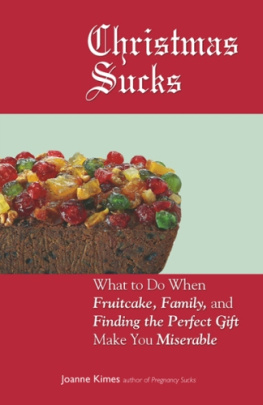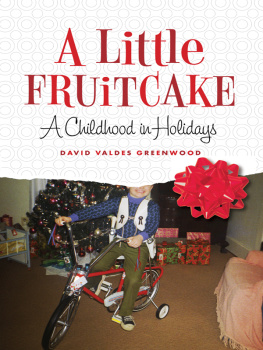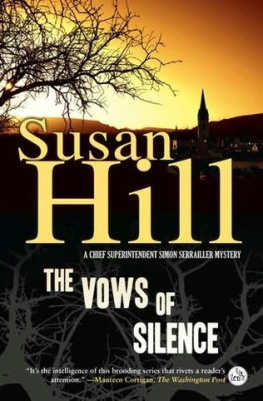This book is dedicated to my parents, Bob and Babe Kuecher and all the interesting characters and situations I have encountered at Fruitcake Hill and in my lifes journeys away from the hill.
I wish to thank my wife, Jean, my older sister, Julie, and my youngest brother, Ed for their un-ending support of my so-called creative endeavors. I also recognize neighbors and friends Hot Dogs B., John R., Jeff B., Jerry B., Kevin and Sheila M., Lori H., Athens S. and various Kuecher siblings for their encouragement to document this family history from Palos Township, Illinois. In addition I thank numerous people I met along the way in the oil business and in academia as well as the characters and friends of the family mentioned in this book and those not mentioned, yet equally deserving.
This book consists largely of the personal reflections, observations and opinions of the author. Various siblings and colleagues were asked to review the work prior to publication. In this way the veracity of the authors stories were corroborated.
The author made considerable efforts to mask the identities of characters and companies in this book. No harm was intended towards any one or any company in writing this book.
Prelude
Fruitcake Hill , published in 2008, lays the background for this story. This document can be read independently, however, if a brief introduction is provided, courtesy to the newcomers.
My family lived in an ancient white farmhouse built in 1871 atop a hill some 23 road miles southwest of the rapidly expanding City of Chicago. The house nearly burned to the ground in 1928 when a 3.5 year old toddler, who later would become our mother (Babe), got into mischief at the cook stove when left alone in the house. Fortunately, fire trucks were able to break through a layer of ice in a nearby gravel pit and pump water to the fire. Babe survived, but was haunted for years about her role in the conflagration.
Our farmhouse was located on a hill in the middle of a very large turf nursery. The owner of the turf nursery purchased the land (76.62 acres) from Babes mother, Florence in 1947 and the monies obtained in that transaction supplemented her earnings as a teacher in the City of Chicago.
Babe spent her pre-school years on the farm but Babes sister, Mary, was raised largely in the City of Chicago. These sisters were close friends but became very different people because they were raised so differently. It was a case of country mouse and city mouse, despite the fact that both were educated at the same school (Academy of Our Lady) in the south Chicago suburb of Beverly.
Both Babe and her sister, Mary, were courted for marriage by the man who would become our father, Robert Kuecher (Bob). In fact, the courting became sufficiently entangled that when Bob asked Babes mother for the hand of her daughter in marriage, Babes mother asked, Which one?
My mother, Babe, was given the farm house and 3.38 acres of property by her mother, Florence OConnell in 1955. And on this property, Bob and Babe raised a family that ultimately numbered fifteen (i.e. thirteen children and two parents).
The house was very old, contained little insulation, and had only three bedrooms, one of which was our parents room. Relief would come in 1967 when Bob and Babe built a new addition on the old house. Instantly the bedrooms increased from three to six and bathrooms increased from one to three. This provided some privacy for our family and its visitors. Yet the kids pine over the idea of the tightly packed community we once had, and perhaps how the family compromised some of its closeness when the new addition was built. The farmhouse and the hill, however, only frame the story of the people that lived here.
Since my book Fruitcake Hill was published in 2008, I have been encouraged to write again. This book, Fruitcake Hill and Beyond (2013) follows one of the family members (the author) from that ancient farmhouse and his professional journey to adulthood. And now with a family of his own, he wonders how Bob and Babe raised such a large family in such a small living space. These questions, and more, challenged the authors ability to tell the story as it really happened.
Fruitcake Hill and this current work are compelling reads because the characters introduced along the journey were so colorful. In that sense, the author did not need to create the characters. He needed only to report on them. The stories that follow provide some insight into the authors lifes journey and partially represents what newscaster, Paul Harvey, would say was the rest of the story.
Fruitcake Hill and Beyond
I grew up in a very special place, I had very special siblings and parents, and I had a happy childhood. Those, at least, were my working hypotheses growing up in Palos Township, Illinois.
But life wasnt perfect. And I now wonder if my mind somehow remembered things differently than they actually occurred. If this is true, there may be little hope of getting at the real truth. Perhaps thats good. A more balanced assessment is to consider us all wounded warriors of our childhood, i.e. still able to love, but also capable of uncharacteristic behavior when those bad memories raise their ugly heads. And life on our hilltop was no exception.
What I have come to believe may be much more important than who I was. I believe I should expect miracles. This positive thinking comes true more often than not in my life experience. And even if a plan or event crashes, I rewrite the event to be positive. This is how I operate.













